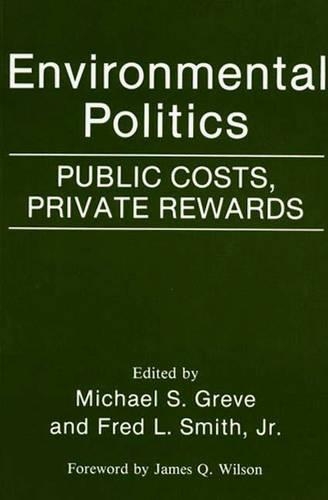
Environmental Politics: Public Costs, Private Rewards
(Paperback)
Publishing Details
Environmental Politics: Public Costs, Private Rewards
By (Author) Michael S. Greve
Edited by Fred L. Smith
Bloomsbury Publishing PLC
Praeger Publishers Inc
20th May 1992
United States
Classifications
Tertiary Education
Non Fiction
Central / national / federal government policies
333.7
Physical Properties
Paperback
232
Description
The essays in this volume challenge the widespread belief that the government's environmental policies, unlike those in other areas, are drafted and implemented to the public good and genuinely seek to effect a cleaner environment. The contributors demonstrate through seven important cases that there are strong reasons to reconsider the present "command and control" approach to environmental policy. They argue that policies and programmes are often designed to address political and economic objectives dear to power centers and interest groups. The authors seek to force a critique of present policies and programmes and to contribute to the making of an environmental policy more authentically in the public's interest. To that end, the work analyzes the role of organized interests and political institutions in environmental policies, what their rationales may be, and what impact they have on the public welfare. The book provides specific case studies of clean air legislation, biotechnology regulation, Superfund, pollution deadlines, citizen suits, and international environmental regulation. The work constitutes a most timely, well-informed, and persuasive argument for more reliance on other sources than just central government to reduce risk and to enhance environmental well-being.
Reviews
"Even someone who finds much in this collection with which to disagree (as I do), will be stimulated by the authors' lively analysis and important arguments."- Professor Steven Kelman Kennedy School of Government Harvard University
"Just as people are imprisoned in the name of liberty, health may be harmed in the name of safety and her children stunted in the name of protecting Mother Nature. This excellent collection of essays will help readers distinguish helping and hurting."-Professor Aaron Wildavsky University of California, Berkeley
"Of the sacred cows left, none is more consistently protected by the major media than the notion that environmental policy is shaped by a struggle between white hats (environmental groups and regulatory agencies) and black hats (industry and private property). This book demolishes this myth and in the process does a service for sound environmental protection. Anyone interested in environmental policy should read this book."- Francis S. Blake Former General Counsel Environmental Protection Agency
"There are two sides to every story, and here is one of them. These essays make the case that special interests of all kinds have contributed to the well-known inefficiency of environmental regulation. Some may disagree with this version of the story, especially those whose interests it gores, but everyone will benefit from hearing it."- Robert W. Fri President, Resources for the Future
The book does enlighten those unaware of how influence has created our economy of environmental protection services.-Ground Water
"The book does enlighten those unaware of how influence has created our economy of environmental protection services."-Ground Water
Author Bio
MICHAEL S. GREVE is Founder and Executive Director of the Center for Individual Rights in Washington, D.C. He has written and published widely on environmental issues. FRED L. SMITH is Founder and President of the Competitive Enterprise Institute in Washington, D.C.
